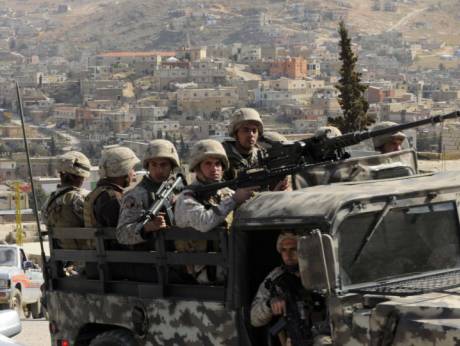
By Laila Bassam
BEIRUT (Reuters) – Lebanese authorities scrambled on Monday to pay overdue salaries to the army, a crisis that has laid bare the extent of paralysis in government and added to criticism of the politicians whose rivalries are to blame.
The salaries were due last week but were delayed because neither the cabinet nor parliament convened to pass a decree needed to transfer the funds. Both bodies have been riven by political tensions linked to wider conflict in the region.
The finance minister said on Monday the problem had been resolved for this month with an exceptional measure that bypasses normal legislative channels. That leaves open the possibility that the problem could recur if the government does not convene to approve longer-term arrangements.
"This situation is totally unacceptable," army commander General Jean Kahwaji told Reuters in a telephone interview before the temporary solution was announced. Lebanon’s politicians needed to "take care of Lebanon and take care of the army. The army is salvation", he added.
"This is unprecedented. It did not happen even during the (civil) war. Never before have salaries been delayed."
Public anger at government failures in Lebanon came to a head this summer when politicians failed to agree a solution to a refuse disposal crisis that allowed rubbish to pile up in the streets.
They have also failed to agree on a new president, leaving Lebanon without a head of state for 17 months. The country has also been without a budget since 2005.
But not paying its soldiers on time has struck an even more jarring chord in a country where the army has been seen as the guarantor of civil peace since the 1975-90 war.
"The problem surrounding payment of salaries was resolved today, and the cabinet must meet to agree to the transfer the funds so we can cover the coming months without problems," Finance Minister Ali Hassan Khalil told Reuters.
Twitter users posted statements of support for the army using the hashtag "Soldier_living_without_salary".
Prime Minister Tammam Salam’s unity government, which groups Lebanon’s rival factions, has struggled to take even basic decisions. It includes the Shi’ite group Hezbollah, which is backed by Iran, and the Future Movement led by Sunni politician Saad al-Hariri, which is backed by regional rival Saudi Arabia.
The Lebanese army, led by a Maronite Christian, is carefully balanced to reflect the sectarian make-up of the country.
It plays an important role in internal security, as well as safeguarding a porous borders with Syria, which has been torn apart by a four-year-long civil war. The army regularly confronts armed groups trying to infiltrate Lebanon from Syria, particularly in the northeast.
(Reporting by Laila Bassam; Writing by Tom Perry and Sylvia Westall; editing by John Stonestreet)



